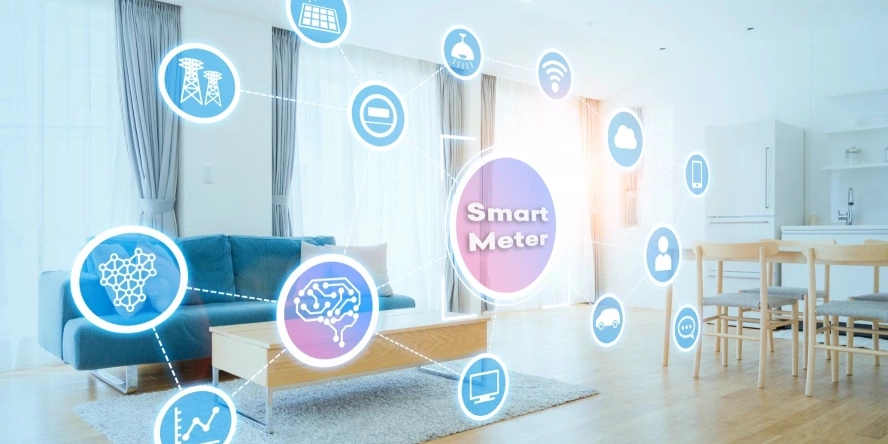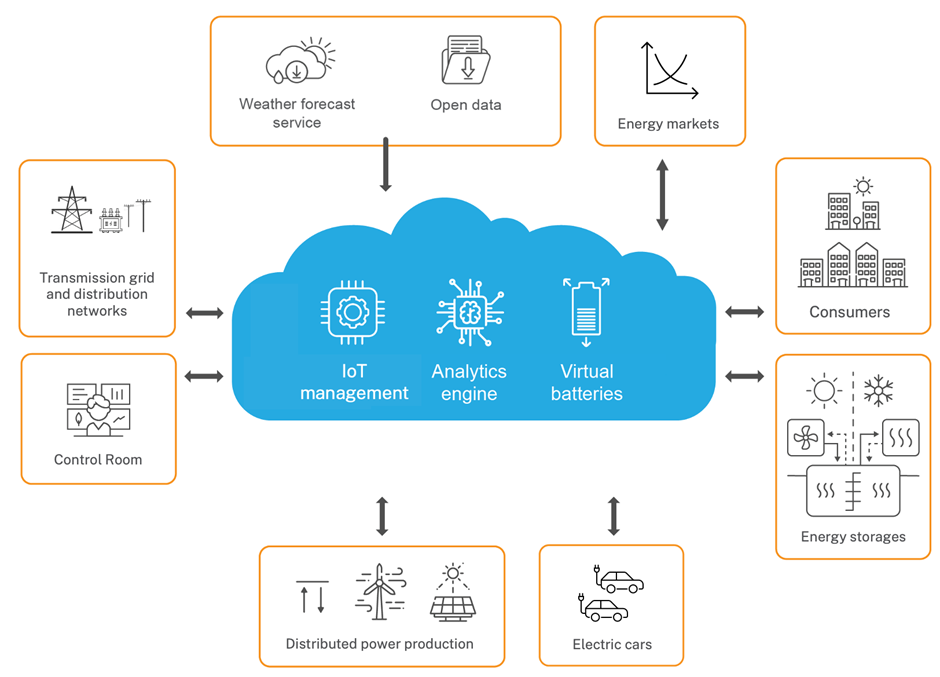
Smart Metering and Data science: A pathway to a more profitable energy system
Working in the Energy Sector? You don’t want to miss this one. We show you how to gain immediate benefits from data science applied to smart metering. Also, if you are a consumer concerned about energy consumption, keep reading.
In summary
Data science applications such as early fault detection, customer segmentation, demand forecasting, human language interpretation, consumption data analysis and non-intrusive load monitoring will become smart metering into a decisive component of the energy transition towards a more sustainable and efficient future.
From energy transition to smart meters
In industry and energy sector, there is a strong shift towards cleaner and more sustainable forms of energy. During this process, the complexity of energy systems and electricity grids increase as the new subsystems, such as energy storage, distributed generation, and electric cars, are added (See image below).

Subsystems in the new electric grid.
Due to such complexity, the traditional ways of managing energy production and distribution networks are no longer sufficient, but new, and more efficient ways of managing the whole must be thought of. Installing the new generation of electricity meters and the analysis of the more precise information obtained from them play a key role in meeting the energy transition goals, which is based on the basic principle that what is not measured cannot be managed and thus improved.
Once the new meters are installed, how do we take advantage of them? Let us first consider what those actors involved in the energy sector are looking for. Electricity utilities seek to improve service reliability, reduce costs, and improve customer satisfaction. End customers, on the other hand, seek to save energy, and lower their energy bill. Recently, more consumers also want to reduce their carbon footprint. Both actors need to get insights from the raw data for the use of better decision making. The solution for both is the application of data science to convert data into useful information.
Role of data science in smart metering
Data science is being increasingly used in smart energy metering to improve energy monitoring and management. In general, intelligent algorithms can identify patterns and trends in energy consumption, detect anomalies or failures, predict future demand, and group the customers. All this can be used for the benefit of the actors in the energy sector, for example:
Improve service reliability and reduce costs:
The early detection of failures or the detection of malfunctioning equipment can be addressed by applying machine learning to the measured raw data. This decreases the downtime, prevents future failures, and improves overall system performance.
Customer segmentation is a frequent practice in the electrical industry. With the new smart meters, a large amount of data is generated that can be used for grouping the premises according to their consumption profile. If in a geographical area a special consumption pattern is detected, then maintenance actions can be applied to avoid interruptions in the service.
The cost reduction is an indirect benefit of the previously mentioned techniques. Thus, early fault detection contributes to reducing the costs of repairing breakdowns. Similarly, customer segmentation improves the accuracy of demand forecasting, enabling optimization of infrastructure, and resulting in cost savings on investment.
Improve customer satisfaction:
Offering only the metering reading to the consumers is no longer enough. Some customers want more and are looking for personalized recommendations for energy efficiency and cost saving. Why not offer them a remote and tailor-made consultancy based on natural language processing and consumption data analysis? Incentives can also be offered to customers in the same group to reduce their consumption in periods of high demand.
In countries with cold climates, like Finland, heating is the largest energy consumer item, making it a prime target for energy-saving measures. In this context, many customers would consider it positive to receive information about how to save energy in this regard. For them, the analysis of consumption versus ambient temperature is relevant information. Besides, the newest techniques such as non-intrusive load monitoring (NILM) can be used to detect the connection of notable loads, such as saunas, water heaters, electric cars, and propose cost saving strategies to specific customers.
In summary, the use of statistical techniques and machine learning to analyze the data collected by smart meters is beneficial for various actors in the electrical system. The insights obtained help decision-making in the energy sector and improve the quality of life of consumers.
Wapice's proven knowledge and experience in energy business
Wapice has been involved in energy projects through the EcoReaction and IoT-TICKET® products. The movement from consumer-oriented energy reporting to a comprehensive energy data management has been led on to the development of EcoReaction – Finland’s most popular energy monitoring and reporting tool. Also, the IoT-TICKET ® platform has proven to be an effective platform for energy processes monitoring.
The products and knowledge at Wapice have been used in different projects where the goals are energy supervision, energy efficiency and optimization projects. In this sense, several projects can be listed for clients such as Helen, UPM Energy, Loimua, Grandlund, Afry.
At Wapice we continually develop by building capabilities to respond to the increasing demands for data analysis. We have even developed our own algorithms to cluster time series data in the context of high data volume and energy consumption. Now all these capabilities and experiences can be applied to smart metering to take it up a notch.
Want to know more? Please contact us for more information or book a virtual introduction. We will be happy to answer any questions.
Authors

Jorge Pacheco

